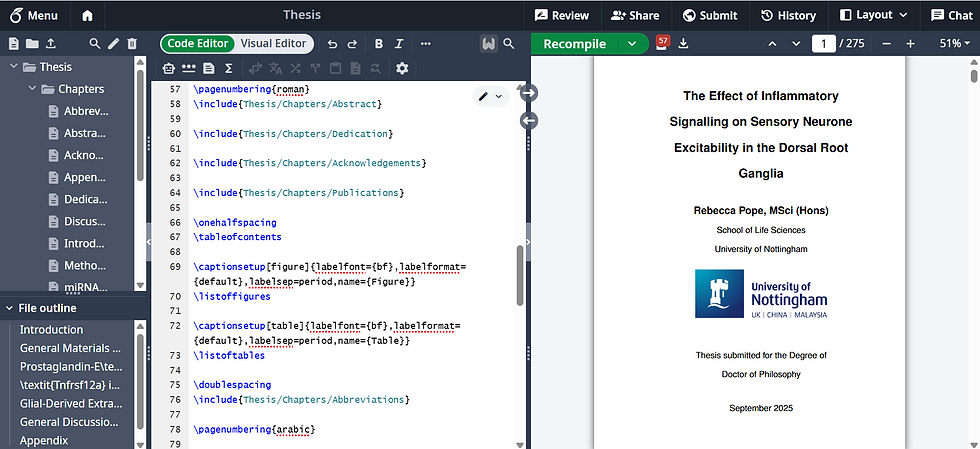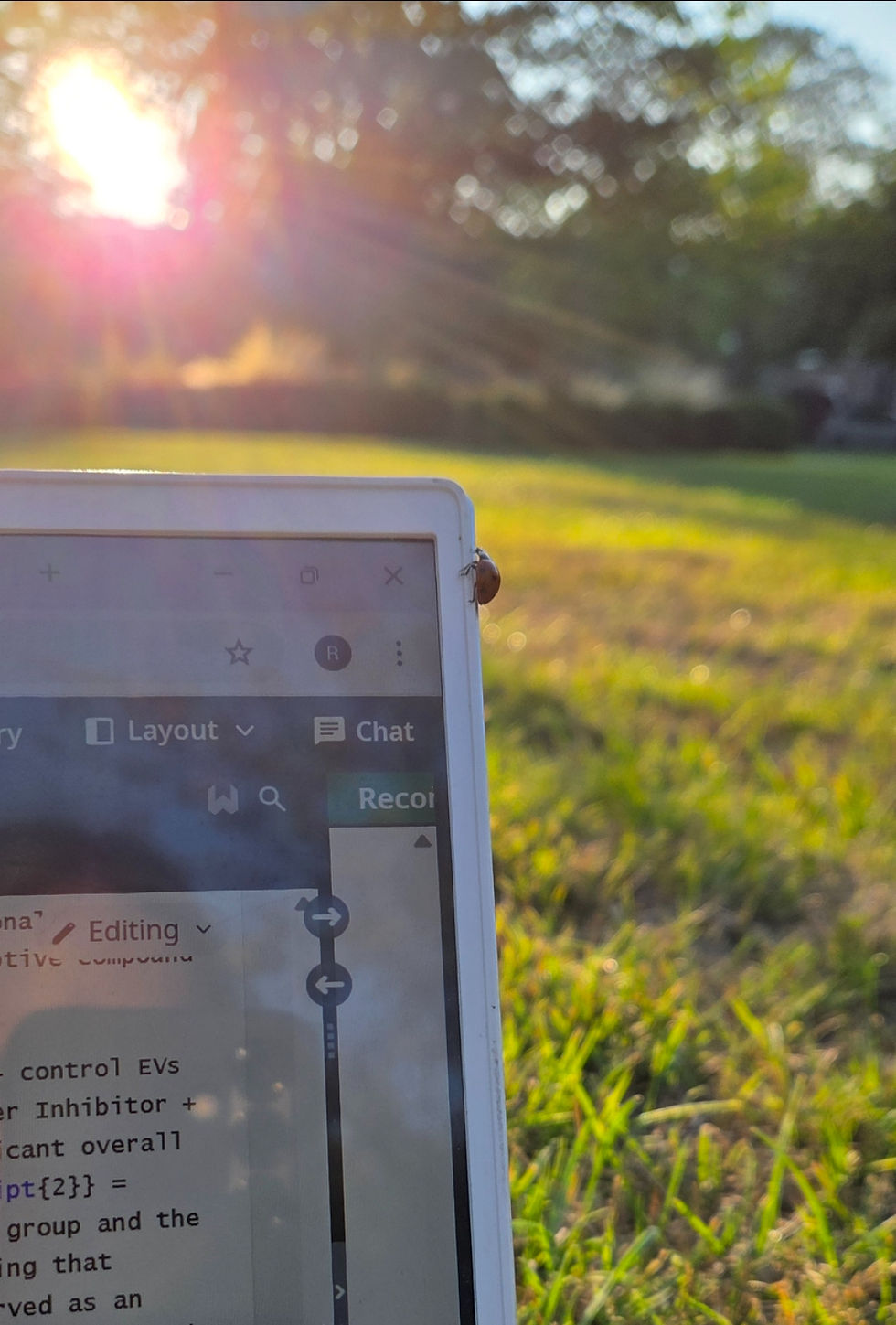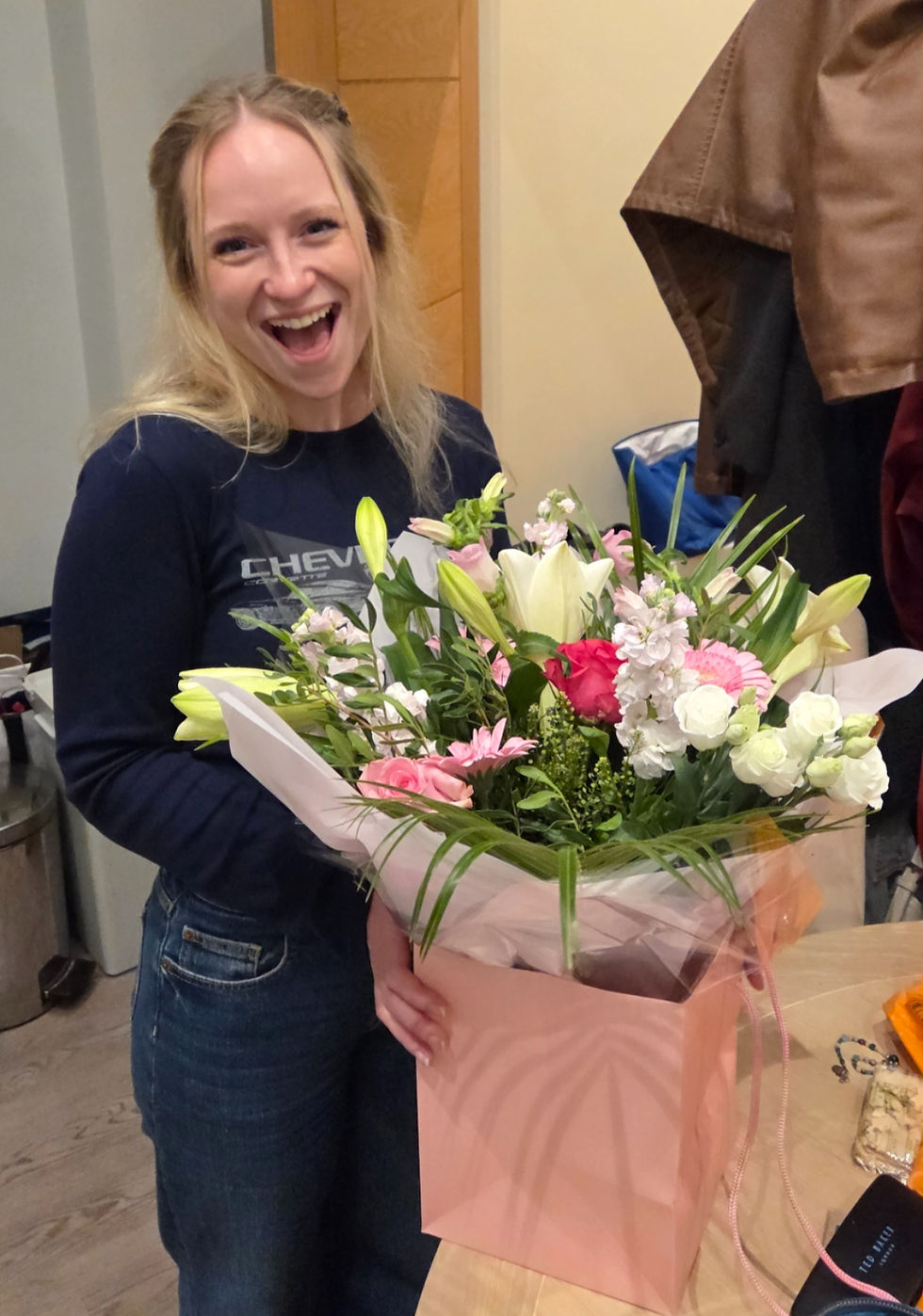How to Survive (and Thrive) While Writing Your Thesis
- Rebecca Pope

- Nov 17, 2025
- 11 min read
I have just survived (and semi-thrived) writing up my PhD thesis. I was regaled with horror stories of becoming a recluse, having unsupportive supervisors, and just being generally unhappy, exhausted, and demotivated. It wasn’t all sunshine and rainbows, but with careful planning, self-motivation, and lots of breaks, I made it through the dreaded write-up relatively unscathed! Here, I share my advice - some of which I followed and others, I wish I had - with you all…
What's Inside:
Getting organised before you even start writing
Finding your writing rhythm and managing motivation
Dealing with feedback and self-doubt
Staying connected and avoiding isolation
Preparing for the final push and submission day
Before You Even Start Writing
Your thesis writing journey begins long before you begin to write. How you conduct yourself during your PhD research will impact the ease and speed of your write-up.
📓Keeping Track 📓

It can be difficult to return to your office after a long day in the lab and force yourself to stay a bit longer to write up your lab notes - however, keeping detailed lab and meeting notes is essential for ‘Future You’ to return to! It is impossible to write notes that are too detailed, so even if it’s something that you do the same every experiment, write something like ‘Refer to page X for full methodology’. You should always keep notes with other people in mind. Your lab book may be referred back to by future researchers so make sure that it doesn’t just make sense to you.
Similarly, having a logical and cross-referenced filing system on your laptop is key. Your lab group may have their own rules, but if not, ensure that you label files with the date (‘year, month, date’ ensures files are listed in chronological order), the experimental replicate, and the experimental title, for example: 251014_Exp001_miRNA_CalciumImaging. These should be filed within logical folders and cross-referenced in your lab book.
It is never too early to start writing or reading papers. Why not try to write up your methods as you go? Protocols can easily be transformed into thesis methods. You may also find publications that explain your technique in a clear and logical manner- use their structure to guide and strengthen your own writing. These may be subject to change, but you have to start somewhere! Or you could start filing papers into folders to come back to later. Try to stay up to date with new research that’s directly relevant to your project. We’re all known for the never-ending tabs and downloads - but a little organisation now can make things much easier (and quicker!) down the line.
If you have them, use end of year university deadlines to your advantage, pulling together all of your research. If not, ask your supervisor to read over something at the end of each year. These reports are incredibly useful; they can be pooled together when you begin to write your actual thesis. Sections may no longer be relevant - such as when PhDs change direction, follow the path of results, or may not fit the narrative anymore - but you won’t know this until later.
🫡Say Yes to Presentations!🫡
Presenting isn’t everyone’s cup of tea - in fact, most people hate it! Saying yes to presentation opportunities, even if you don’t want to, gives you the rare chance to receive external feedback on experimental design, constructive criticism of interpretation and data presentation, and suggestions for future directions. It is incredibly valuable to receive feedback from people beyond your supervisors - external validation can be great for confidence and give you those little motivation boosts we all need! Presentations also force you to pull data together, finalise your figures, and generate a narrative. It can even make you aware of future viva questions.

📝Sketch the Structure Before You Start Writing📝
I wasn’t originally a big fan of writing a thesis plan - it was a requirement for one of my end of year reports. However, it ensures that your supervisors can quickly scan your structure, giving advice early on, before you waste time writing just to find out that they want you to make major structural changes! You could also use the thesis plan document itself to write your thesis, replacing your bullet points with proper text. I didn’t make full use of this, but wish I had!
Find Your Writing Rhythm
🖥️Get Tech-Savvy with Your Thesis🖥️
Consider using Overleaf, a free online writing platform built for researchers and students. It uses LaTeX, a typesetting system that takes care of tricky formatting, like citations, equations, and figures, so your document always looks professional. Although it’s just another thing to spend time learning, I was able to view my whole thesis as one cohesive document, linked to my reference manager (Mendeley), and my thesis didn’t crash like Word documents can. It was also much easier to format and could be exported directly as a PDF. Many universities provide free premium subscriptions to Overleaf so that you can use all features - check this using your university email. There are lots of informative LaTeX guides, templates, and Reddit threads online which helped with learning how to use it. Bear in mind, it does require WiFi to access and update it!

It is essential that you select and use a reference manager as soon as you start writing - managers include Mendeley, EndNote, and Zotero. Add references to it as you read them and learn how to effectively use the platform as soon as possible - cleaning up references at the end of writing is painful if you haven’t formatted consistently from the start. In addition to a manager, I had an Excel document with different sheets allocated to different aspects/topics of my thesis - I would enter papers, link them, and provide a summary so that I could easily refer back to them when it came to my discussion.
Decide as early as you can how you are going to construct your figures - Illustrator, BioRender™, or PowerPoint. Using consistent colours, fonts, and layouts saves you a lot of time later! Make sure to also consider accessibility - clear contrasting colours (e.g., colour blind friendly colours) and readable text sizes make your figures easier to interpret.
🌱Progress, Not Perfection🌱
The PhD thesis is like nothing you’ve ever written before - the word count and volume of content can be very daunting. Start with something small, even if it’s adding bullet points to sections and coming back to flesh them out at a later date. It may help to plan what you are going to focus on each day, but don’t plan too far in advance - you might struggle to stick perfectly to the plan and this can be demotivating.
It is impossible to work at 100% everyday, so be kind to yourself! On days when you are struggling to focus, do something that requires less focus, such as writing methods, making figures, or completing any analysis - things that might allow you to watch Netflix at the same time! Just remember, that every task you do gets you closer to the goal and it’s a marathon, not a sprint; just turning up everyday and doing something is absolutely better than nothing!
Back up your data and your thesis drafts regularly, saving versions by date and keeping copies in at least two locations (OneDrive, Dropbox, Teams, a hard drive, your laptop). Losing even a small section is disheartening.
☕Where (and How) You Work Matters☕
Figure out when you work best! It’s true that some people work better in the mornings and others at night. The earlier you work this out, the more you can control your time productively. The PhD write-up is a unique situation where you are in complete control of your time - a blessing and a curse! - and this can be useful self-direction for future careers. Similarly, get to know when your supervisor works best: one of my supervisors was most productive early in the morning, so there was little point sending him anything after 2 pm, whereas other academics may work best later in the evening. Understanding these patterns can really help with communication and timely feedback.
Make sure you remove distractions from your workspace. Staying in contact with the outside world is important, but try to put your phone in another room, or mute it for a couple of hours, so that you can complete some solid focus time. It is too easy for us - me included - to become distracted by doom scrolling, especially if we really don’t feel like writing that day. If you are working from home, you can also do what I call ‘productive procrastination’, which might involve cleaning, tidying, and laundry (I even cleaned my oven!). Although useful, use the most productive hours of the day to work on your thesis. You may even be distracted by other sections of your thesis! New ideas or remembering that you never finished that paragraph or added that method will pop into your head now and then. Try not to drop what you’re working on to move to another section. Instead, have a to-do list on a Word document, broken up into chapters, to jot down these things ready for you to come back to them later, without breaking your current flow.

Mix up where you work! Hiding away at home (preferably at a desk) 24/7 during your write-up can be boring - if you feel like your focus is waning, move to a new location! Suggestions include the library, home, the office, or a cafe. I found that this was enough to find new motivation and drive to continue, which I wouldn’t have found just staying at home.
That being said, make sure you do take lots of breaks. The human brain is not designed to intensely focus on one thing for hours on end, particularly looking at screens. Get up, move around, go outside, do some yoga (or similar stretches), or get a hot drink. Remember the 20-20-20 rule? Every 20 minutes look 20 metres away for 20 seconds. This should save your eyes a bit and stave off headaches. Scrolling on your phone is not a break! Blue light glasses can be useful, especially if you work in the evenings, to prevent your body clock from being affected.

💫Don’t Put the Rest of Your Life on Hold💫
I was determined not to work during weekends for as long as possible during the write-up to prevent burnout. It created a healthy balance where I continued to do nice things at the weekend, always having things to look forward to, even if this was just having a break. The final month did involve working on Saturdays and Sundays, but I was relieved that this wasn’t
the case before then.

See your friends and family! Book in things to look forward to - preferably not drinking though as any hangovers will just wipe out the following day’s work and negate the benefits of socialising. I went to cafes with one of my friends to have company, catch-up, and to keep each other motivated on our theses! Becoming a recluse only makes you feel down and less motivated, and so is unlikely to save you time in the end. Continue your hobbies - whether that be the gym, reading, running, or drawing - to give your brain a welcome break.
Sharing Your Work and Getting Feedback
⌛Deadlines Are Your Friends⌛
In the six months leading up to hand-in, strike up a conversation with your supervisors asking when they will realistically be able to make space in their busy schedule to read your work and work towards those deadlines. For me, this was June and September (handed in at the end of September). I showed my supervisors a first draft of my chapters in June (some had ‘this data will go here’ and missing references, but they could see the narrative flow) and then refined versions in September.
I converted my PDF thesis chapters to Word documents and uploaded them to Microsoft Teams, adding comments and clarifications down the side for them to reply to. My supervisors would go through it, edit on tracked changes, and leave comments. A live document is best for this so that you and your supervisors can see each other’s comments in real-time (Teams, Google drive links, OneDrive links).
🤔Feedback is Part of the Process🤔

Feedback can be difficult to receive, especially negative feedback when you have worked so hard to produce a draft. Keep in mind that this is constructive and your supervisors want the best for you! It is better to have these things flagged now, rather than during your viva. At this stage, it can be really helpful to talk things through with friends or colleagues. They can offer fresh perspectives and help you see your work more objectively. It’s natural to feel protective of your project or thesis and to take feedback personally, but outside viewpoints can make it easier to separate critique from criticism. There may be times when you disagree with comments - if this is the case, discuss them with your supervisors rather than just ignoring and deleting them, but this doesn’t necessarily mean you have to take all of their advice on board!
If you delete sections, consider adding them to a separate document and naming them ‘Name of Section Here - Removed From Thesis’ in case you decide at a later date that you need to add it back in.
The Home Stretch
🫠Final Checks and Submission Day🫠
Once you’ve made it through the slog, it’s time to do your final checks and formatting. Make sure you read about how to submit in advance - your university will have postgraduate handbooks or webpages detailing this. There may be lengthy forms to fill out and you might want to place/apply for an embargo (restriction) on your thesis, so that your thesis isn’t published online for a while - sometimes this has to be done in advance of submission. Don’t get caught out by thinking it’s just a ‘drag and drop’ thesis upload five minutes before the deadline, and you may even incur a fee for late submission!
If you are using Word, don’t leave combining your chapters too last minute as this doesn’t always go smoothly. Have a checklist to go through before submission which includes checking for typos, confirming all of your abbreviations are listed, reading figure legends and n numbers, formatting, checking figure and table numbers, and verifying that your reference list is complete.
If you are cutting it a bit fine with your deadline, typos, page numbers, and misnumbered figures can wait for corrections! Focus on the main content of your thesis to ensure the science is sound and contextualised within the literature - this is the most useful for your viva.
🎊After Hand-In: Rest, Reflect, and Prepare for the Viva🎊

Congratulations, you’ve handed in! Once you’ve submitted, celebrate - but keep your notes handy for the viva. Revisit your thesis after a few weeks with fresh eyes, print it out, jot down potential questions, and remind yourself that no one knows your project better than you. I would recommend avoiding having a job that starts immediately. Try to have a couple of weeks rest as you might be hit with a big wave of fatigue and need to sleep a lot!
And finally remember, everyone’s timeline, writing style, and supervision set-up is different. Try not to compare yourself to others - focus on steady progress rather than perfection. If PhDs were easy, everyone would do one!
This article was written by Rebecca Pope and edited by Neave Smith, with graphics produced by Ishika Joshi. If you enjoyed this article, be the first to be notified about new posts by signing up to become a WiNUK member (top right of this page)! Interested in writing for WiNUK yourself? Contact us through the blog page and the editors will be in touch.




Comments